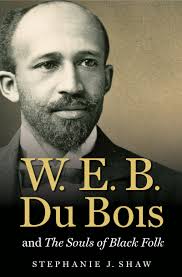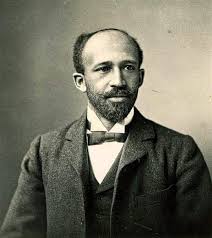The Souls of Black Folk Page #14
The Souls of Black Folk is a 1903 work of American literature by W. E. B. Du Bois. It is a seminal work in the history of sociology and a cornerstone of African-American literature. The book contains several essays on race, some of which the magazine Atlantic Monthly had previously published.
The black men of America have a duty to perform, a duty stern and delicate,—a forward movement to oppose a part of the work of their greatest leader. So far as Mr. Washington preaches Thrift, Patience, and Industrial Training for the masses, we must hold up his hands and strive with him, rejoicing in his honors and glorying in the strength of this Joshua called of God and of man to lead the headless host. But so far as Mr. Washington apologizes for injustice, North or South, does not rightly value the privilege and duty of voting, belittles the emasculating effects of caste distinctions, and opposes the higher training and ambition of our brighter minds,—so far as he, the South, or the Nation, does this,—we must unceasingly and firmly oppose them. By every civilized and peaceful method we must strive for the rights which the world accords to men, clinging unwaveringly to those great words which the sons of the Fathers would fain forget: “We hold these truths to be self-evident: That all men are created equal; that they are endowed by their Creator with certain unalienable rights; that among these are life, liberty, and the pursuit of happiness.” IV. Of the Meaning of Progress Willst Du Deine Macht verkünden, Wähle sie die frei von Sünden, Steh’n in Deinem ew’gen Haus! Deine Geister sende aus! Die Unsterblichen, die Reinen, Die nicht fühlen, die nicht weinen! Nicht die zarte Jungfrau wähle, Nicht der Hirtin weiche Seele! SCHILLER. Once upon a time I taught school in the hills of Tennessee, where the broad dark vale of the Mississippi begins to roll and crumple to greet the Alleghanies. I was a Fisk student then, and all Fisk men thought that Tennessee—beyond the Veil—was theirs alone, and in vacation time they sallied forth in lusty bands to meet the county school-commissioners. Young and happy, I too went, and I shall not soon forget that summer, seventeen years ago. First, there was a Teachers’ Institute at the county-seat; and there distinguished guests of the superintendent taught the teachers fractions and spelling and other mysteries,—white teachers in the morning, Negroes at night. A picnic now and then, and a supper, and the rough world was softened by laughter and song. I remember how— But I wander. There came a day when all the teachers left the Institute and began the hunt for schools. I learn from hearsay (for my mother was mortally afraid of firearms) that the hunting of ducks and bears and men is wonderfully interesting, but I am sure that the man who has never hunted a country school has something to learn of the pleasures of the chase. I see now the white, hot roads lazily rise and fall and wind before me under the burning July sun; I feel the deep weariness of heart and limb as ten, eight, six miles stretch relentlessly ahead; I feel my heart sink heavily as I hear again and again, “Got a teacher? Yes.” So I walked on and on—horses were too expensive—until I had wandered beyond railways, beyond stage lines, to a land of “varmints” and rattlesnakes, where the coming of a stranger was an event, and men lived and died in the shadow of one blue hill. Sprinkled over hill and dale lay cabins and farmhouses, shut out from the world by the forests and the rolling hills toward the east. There I found at last a little school. Josie told me of it; she was a thin, homely girl of twenty, with a dark-brown face and thick, hard hair. I had crossed the stream at Watertown, and rested under the great willows; then I had gone to the little cabin in the lot where Josie was resting on her way to town. The gaunt farmer made me welcome, and Josie, hearing my errand, told me anxiously that they wanted a school over the hill; that but once since the war had a teacher been there; that she herself longed to learn,—and thus she ran on, talking fast and loud, with much earnestness and energy. Next morning I crossed the tall round hill, lingered to look at the blue and yellow mountains stretching toward the Carolinas, then plunged into the wood, and came out at Josie’s home. It was a dull frame cottage with four rooms, perched just below the brow of the hill, amid peach-trees. The father was a quiet, simple soul, calmly ignorant, with no touch of vulgarity. The mother was different,—strong, bustling, and energetic, with a quick, restless tongue, and an ambition to live “like folks.” There was a crowd of children. Two boys had gone away. There remained two growing girls; a shy midget of eight; John, tall, awkward, and eighteen; Jim, younger, quicker, and better looking; and two babies of indefinite age. Then there was Josie herself. She seemed to be the centre of the family: always busy at service, or at home, or berry-picking; a little nervous and inclined to scold, like her mother, yet faithful, too, like her father. She had about her a certain fineness, the shadow of an unconscious moral heroism that would willingly give all of life to make life broader, deeper, and fuller for her and hers. I saw much of this family afterwards, and grew to love them for their honest efforts to be decent and comfortable, and for their knowledge of their own ignorance. There was with them no affectation. The mother would scold the father for being so “easy’; Josie would roundly berate the boys for carelessness; and all knew that it was a hard thing to dig a living out of a rocky side-hill. I secured the school. I remember the day I rode horseback out to the commissioner’s house with a pleasant young white fellow who wanted the white school. The road ran down the bed of a stream; the sun laughed and the water jingled, and we rode on. “Come in,” said the commissioner,—‘come in. Have a seat. Yes, that certificate will do. Stay to dinner. What do you want a month?” “Oh,” thought I, “this is lucky’; but even then fell the awful shadow of the Veil, for they ate first, then I—alone. The schoolhouse was a log hut, where Colonel Wheeler used to shelter his corn. It sat in a lot behind a rail fence and thorn bushes, near the sweetest of springs. There was an entrance where a door once was, and within, a massive rickety fireplace; great chinks between the logs served as windows. Furniture was scarce. A pale blackboard crouched in the corner. My desk was made of three boards, reinforced at critical points, and my chair, borrowed from the landlady, had to be returned every night. Seats for the children—these puzzled me much. I was haunted by a New England vision of neat little desks and chairs, but, alas! the reality was rough plank benches without backs, and at times without legs. They had the one virtue of making naps dangerous,—possibly fatal, for the floor was not to be trusted. It was a hot morning late in July when the school opened. I trembled when I heard the patter of little feet down the dusty road, and saw the growing row of dark solemn faces and bright eager eyes facing me. First came Josie and her brothers and sisters. The longing to know, to be a student in the great school at Nashville, hovered like a star above this child-woman amid her work and worry, and she studied doggedly. There were the Dowells from their farm over toward Alexandria,—Fanny, with her smooth black face and wondering eyes; Martha, brown and dull; the pretty girl-wife of a brother, and the younger brood.
Translation
Translate and read this book in other languages:
Select another language:
- - Select -
- 简体中文 (Chinese - Simplified)
- 繁體中文 (Chinese - Traditional)
- Español (Spanish)
- Esperanto (Esperanto)
- 日本語 (Japanese)
- Português (Portuguese)
- Deutsch (German)
- العربية (Arabic)
- Français (French)
- Русский (Russian)
- ಕನ್ನಡ (Kannada)
- 한국어 (Korean)
- עברית (Hebrew)
- Gaeilge (Irish)
- Українська (Ukrainian)
- اردو (Urdu)
- Magyar (Hungarian)
- मानक हिन्दी (Hindi)
- Indonesia (Indonesian)
- Italiano (Italian)
- தமிழ் (Tamil)
- Türkçe (Turkish)
- తెలుగు (Telugu)
- ภาษาไทย (Thai)
- Tiếng Việt (Vietnamese)
- Čeština (Czech)
- Polski (Polish)
- Bahasa Indonesia (Indonesian)
- Românește (Romanian)
- Nederlands (Dutch)
- Ελληνικά (Greek)
- Latinum (Latin)
- Svenska (Swedish)
- Dansk (Danish)
- Suomi (Finnish)
- فارسی (Persian)
- ייִדיש (Yiddish)
- հայերեն (Armenian)
- Norsk (Norwegian)
- English (English)
Citation
Use the citation below to add this book to your bibliography:
Style:MLAChicagoAPA
"The Souls of Black Folk Books." Literature.com. STANDS4 LLC, 2025. Web. 24 Feb. 2025. <https://www.literature.com/book/the_souls_of_black_folk_310>.








Discuss this The Souls of Black Folk book with the community:
Report Comment
We're doing our best to make sure our content is useful, accurate and safe.
If by any chance you spot an inappropriate comment while navigating through our website please use this form to let us know, and we'll take care of it shortly.
Attachment
You need to be logged in to favorite.
Log In